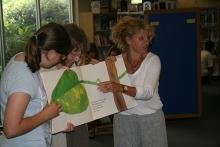The most recent annual report from the Office of the Student Ombuds is now available. You’ll see that our office met with students from every academic level representing all but one school or college. You may also note that students brought a wide range of concerns to our office, including issues both in- and outside the classroom.
Om * buds * man: defined as a person who hears and attempts to resolve complaints and problems, as between students and a university.
The University is a very large and complex organization. As in any organization of this size and complexity, conflict is inevitable. As the University Ombudsman, students can visit me to talk about problems and disputes they are having with the University. I work individually with students (and sometimes with others across campus) to help them clarify issues and resolve conflicts. I also help the University identify systems, policies and procedures that can be improved. I am hoping this blog can be an opportunity to expand the conversation on campus about conflict and conflict management.
Too often we only think about conflict when we are neck deep in one, when the way out seems unimaginable. And yet I do believe that we can all benefit from more intentional conversation about conflict. I hope you will join me in thinking and talking about conflict here at the University, and the ways we can use conflict to make this an even better place. I'll be sharing occasional thoughts about the practice of conflict management, the Ombuds role in that process, and specific issues that are on my mind. I invite you to join in that conversation.
Tom Lehker, University Ombudsman
The Scarf Model and Conflict
I have recently become familiar with the SCARF Model as a way to think about how we interact with others. In particular, I think about this model as it relates to potential conflict. The model, based on a paper by David Rock, suggests that there are five social domains that activate the same threat and reward responses we use for physical survival. The model helps explain the sometimes strong emotional reactions we may have in social interactions, and thus sometimes the root of conflict.
Why Contact the Ombuds Office?
Students sometimes wonder if or why they should contact the student ombuds. In fact, students contact us for many reasons. Sometimes, students just want to talk through a situation. Others are reluctant to go through formal channels, while some don’t know where to begin. Many students have tried other avenues to obtain help, but have not found the assistance they need.
I have had many students tell me that a particular list on our website resonates with them. The list suggests you may want to contact the office if you are having a serious dispute with the University and you:
Lessons Continually Learned, Part II
Successful conflict resolution is often far more art than science. When I talk about the work of an ombuds, and the ways I try to approach conflicts, I am continually reminded of some approaches that can help me do my job better, and that may help anyone resolve conflict more productively. A while back I posted part 1 of what I like to call some lessons that I am continually learning. Here are some additional important things I try to keep in mind:
Emotions and Conflict
Often in ombuds work, we become involved in situations that are laden with intense emotion. We may talk with students and others who convey anger, hostility, or resentment. It is often helpful to acknowledge those emotions. But I also believe that often, especially in high-stakes, difficult situations, strong emotions can serve as a placeholder for other concerns.
Lessons Continually Learned, Part I
Successful conflict resolution is often far more art than science. When I talk about the work of an ombudsman, and the ways I try to approach conflicts, I am continually reminded of some approaches that can help me do my job better. Below is part 1 of what I like to call some lessons that I am continually learning:
The Danger of a Single Story
Author Chimamanda Adichie talks about the importance of stories, and the danger of a single story.







